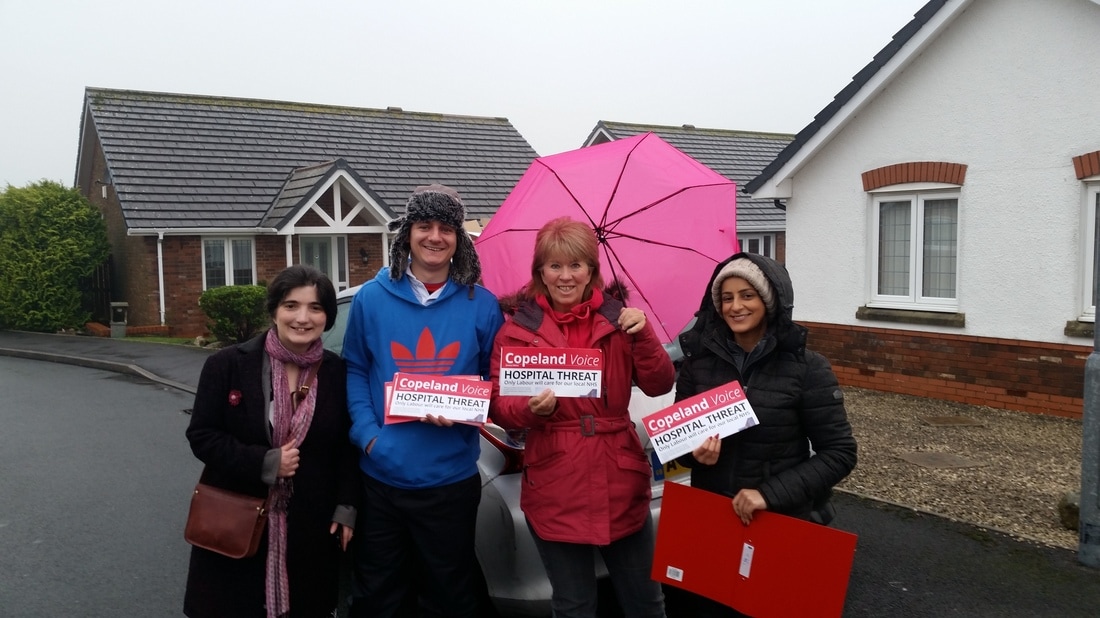
The constituency of Copeland has long been disadvantaged in terms of access to healthcare; it is the very geography of its coastal and mountainous lakeland communities that provide natural barriers to service provision. The roads wind round lakes and bogs and the mountains ensure that they take you the long way round: Very pretty when you are on holiday but potentially lethal if you need acute hospital care quickly. Perhaps people thought that things were on the up when David Cameron ordered the building of the new West Cumberland Hospital, now they are wondering why on earth the Government has changed it's mind and services are to be scaled down there.
Acute health services often function best when expertise, facilities and expensive equipment are centralised in centres of excellence. Such centres can have high patient numbers which keeps staff working efficiently and constantly learning and improving. However there is absolutely no point in planning services without taking into account the access needs of the people for whom the services are actually intended. The analysis prepared by ‘West Cumbrians’ Voice for Healthcare’ show that car journey travel times for patients and visitors will increase dramatically if some services are realigned as proposed from West Cumberland Hospital (WCH) at Whitehaven to Cumberland Infirmary Hospital (CIH) at Carlisle (as per the ‘West, North and East Cumbria Success Regime proposals.’)
For residents of Seascale (population 3355) a car journey to WCH at Whitehaven would take 22 minutes but to travel to CIH in Carlisle would take 1 hour 24 minutes! http://media.wix.com/ugd/72d525_82657271db774674abf69a9f5804d498.pdf an increase of over an hour. Bus journeys would take over 2 hours and be a total nightmare when making regular visits to a friend or relative undergoing treatment. For those who make their living in the more remote hills and valleys as farmers or in the tourism trade, reduced access to services will be a certainty.
Copeland is a varied area in terms of industry as well as geography: Sellafield by Seascale was the site of the first nuclear power station in the world to generate power on an industrial scale. The 2 Sellafield sites of Calder Hall and Windscale are now in process of being decommissioned and many of the staff live in the surrounding area. However the skills and commitment of the local workforce will not be lost, they will be fully occupied and developed by the continued work of decommissioning and new Nuclear power station which is nearing completion of the planning phase. Those workers do not deserve reduced health services.
To service the new Moorhouse nuclear power station (building due to start 2020) there will be extensive new housing projects in the Whitehaven, Egremont area; the homes will be needed for the workers building the nuclear facility, new marine loading, train line work and road building. Patient demand for services will increase greatly in the coming years and these increases do not appear to have been factored in to the proposed cuts and changes to local heath services: This is both shortsighted and a significant risk to public health both now and in the future.
Copeland also has significant levels of deprivation, 4 of her communities, Sandwith, Mirehouse, Harbour and Cleator Moor South, are within the country’s 10% most deprived http://www.cumbriaobservatory.org.uk/elibrary/Content/Internet/536/675/1766/1775/4207415584.pdf
The deprivation found in Copeland means that many residents do not have cars and rely on bus services to reach hospital: It also means that many have very low incomes which is generally one of the key reasons for people not accessing health care when they need it; folk simply wont have the money to travel to hospital appointments, particularly if they have dependants with them and have to buy multiple bus tickets. Child poverty and poor life expectancy for women is of particular concern in certain parts of Copeland; It is just not acceptable to plan services without taking these specific conditions into account and it’s beginning to look like that is exactly what has happened.
We must campaign hard to ensure that residents of Copeland do not lose key services such as the consultant led maternity unit in WCH; the fast growing population, the evidenced poor health of many mums and high child poverty in some communities are known precursors to difficult births and other health problems and are therefore absolute bars to cutting this service. The government is responsible for the underfunding of the NHS in recent years and that and their deliberate cutting back on on numbers of doctor and nurse training opportunities and their undermining of the health professions is the cause of the current staff shortages in Copeland and elsewhere. The government and the LibDems must be shamed on this issue and the public enlightened as to why a vote for anyone but a Labour candidate is the death knell of their precious services. I walked 300 miles in 2014, from Jarrow to Westminster, to raise public awareness about the Tory’s destructive plans for the NHS and now the public are beginning to realise the extent of their plans; we must drive the message home in this by-election so every part of the country hears it.
 RSS Feed
RSS Feed
